|
|
|
Sort Order |
|
|
|
Items / Page
|
|
|
|
|
|
|
| Srl | Item |
| 1 |
ID:
170899
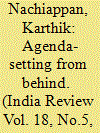

|
|
|
|
|
| Summary/Abstract |
India’s approach and policies at climate change negotiations have garnered considerable interest and attention. Over the last three decades, India’s positions have gained more importance as its carbon emissions rise. In this article, I explain India’s ratification of the Framework Convention on Climate Change (FCCC) using the New Interdependence approach, a framework that explains state behavior by analyzing how global rules affects the domestic politics and policymaking around a particular issue. Specifically, I map how the conflicts around which countries should address global warming influenced the domestic politics of climate change in India, particularly the rise of MEA in leading India’s policymaking on climate change, including FCCC negotiations. MEA’s political understanding of climate change, sharpened by two domestic environmental groups – TERI and CSE, decisively shaped India’s approach at FCCC negotiations. Indian negotiators focused on hammering the differences between developed and developing countries helping shape a Framework Convention that differentiated climate responsibilities based on development constraints.
|
|
|
|
|
|
|
|
|
|
|
|
|
|
|
|
| 2 |
ID:
170901
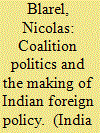

|
|
|
|
|
| Summary/Abstract |
Do Indian regional parties influence foreign policy and under which conditions? Some foreign policy studies have shown that certain coalition-building configurations have facilitated the inclusion of the concerns of small parties in the foreign policy debate. Other works have looked at the role of decentralization and federal power-arrangement in providing more control to political sub-units over the external affairs of a state. Those separate scholarships provide interesting insights to account for the multi-level nature of coalition-building in a federal and pluralistic polity like India. Bridging these two literatures, I argue that the interdependence of regional and national coalition building processes (visible in federal settings) create locked-in alliances between national parties and regional parties which affect foreign policymaking. In these contexts, India’s national parties have to, under certain conditions, take into account the preferences of regional parties when designing foreign policies. This article looks at the hypothesized causal mechanisms and expectations through two illustrative case studies of India’s foreign policy.
|
|
|
|
|
|
|
|
|
|
|
|
|
|
|
|
| 3 |
ID:
170895


|
|
|
|
|
| Summary/Abstract |
This article explores new lines of conceptualization to understand India’s regional behavior. It argues that the twin concepts of relational power and domestic balance of forces provide better insights into India’s post-Cold war responses than some of the available explanations. It allows us to connect the domestic and external dimensions of policy and identify the cluster of state and non-state actors that shape policy responses. Imagining India’s regional behavior in relational terms allows us to better explain the gap between power and policies, what current literature has identified as the key puzzle in India’s foreign policy behavior.
|
|
|
|
|
|
|
|
|
|
|
|
|
|
|
|
| 4 |
ID:
170894
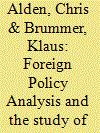

|
|
|
|
|
| Summary/Abstract |
This article proposes that the study of Indian foreign policy and Foreign Policy Analysis (FPA) offers a “win-win situation” for scholarship. On the one hand, this bridge-building exercise leads to a better understanding of the making and substance of Indian foreign policy. On the other hand, it advances FPA in both theoretical and empirical terms, thus contributing to overcoming FPA’s US/Western bias and to decentering the field more generally. Framing the argument in terms of levels of analysis, we offer specific contributions to the understanding of foreign policy in areas such as leadership traits, poliheuristic theory, coalition politics, and state-society influences. Moreover, this line of research suggests the contours of a new comparative foreign policy agenda which could emerge from this examination of Indian foreign policy.
|
|
|
|
|
|
|
|
|
|
|
|
|
|
|
|
| 5 |
ID:
170902
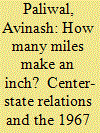

|
|
|
|
|
| Summary/Abstract |
Unabated protests in Manipur against India’s boundary with Myanmar and the lack of demarcation of some boundary pillars, despite the signing of the India-Burma Boundary Agreement in 1967, makes it an important case to study how center-state relations impact India’s foreign policy decision-making and implementation processes. Based on fresh archival material, this article explains why New Delhi refused to consult state governments in Northeast India before signing the boundary agreement, and the limiting consequences of such a top-down decision-making approach during the demarcation phase. A postcolonial entity that struggled to generate legitimacy in and assert sovereign control over the Northeast, India’s approach on this issue offers an opportunity to reflect upon the (limited) conceptualization of, and ongoing debates around, the idea of a ’state’ within foreign policy analysis.
|
|
|
|
|
|
|
|
|
|
|
|
|
|
|
|
| 6 |
ID:
170896


|
|
|
|
|
| Summary/Abstract |
Why did India launch and later withdraw from the exercise in coercive diplomacy – Operation Parakram – against Pakistan in response to the attack on India’s Parliament by terrorists based in that country? This paper marshals factors operating at the systemic, state and individual/small-group levels of analysis to show that, despite the paucity of evidence on decisionmaking of the kind required for an effective foreign policy analysis (FPA) approach, a reasonably clear picture can be developed. It combines deductive logic relating to state behavior in a nuclearized environment with the limited empirical evidence available to show that India never intended to go to war and that the operation was essentially a bluff that, having eventually reached a dead end, was called off.
|
|
|
|
|
|
|
|
|
|
|
|
|
|
|
|
| 7 |
ID:
170898


|
|
|
|
|
| Summary/Abstract |
How did China and India manage to prevent the 1986-87 Sumdorong Chu Crisis from escalating into a war? I argue that it was a combination of changing geopolitical factors (Sino-Soviet rapprochement and the end of Soviet support for India in the context of Sino-Indian tensions) and military factors (conventional deterrence and perceptions of limited revisionism) that help explain crisis management. While these geopolitical and military factors helped avert immediate escalation, the crisis truly ended only after China and India sought a new modus vivendi during Prime Minister Rajiv Gandhi’s landmark trip to China in December 1988. The absence of great power (Soviet) support meant that India had to make a costly signal to China in the form of Gandhi’s trip that happened during the 1987-89 cycle of protests in Tibet against Chinese rule. Nevertheless, Gandhi’s visit took place after India had demonstrated its military strength and resolve in its ability to defend the status quo on the border, and therefore should not be interpreted as a sign of weakness. In other words, I argue that successful deterrence requires broader foreign policy reorientation. At the same time, considerations of power (in the form of internal/external balancing) are central to strategic stability in the Sino-Indian dyad, and that any recourse to diplomacy that ignores the realities of military power is unlikely to be successful for crisis managemen
|
|
|
|
|
|
|
|
|
|
|
|
|
|
|
|
| 8 |
ID:
170893
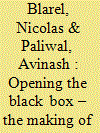

|
|
|
|
|
| Summary/Abstract |
Most studies looking at India’s external policies continue to “black-box” the actual process of how Indian foreign policy is made. More specifically, most studies generally overlook how India’s complex domestic polity and bureaucratic apparatus shape India’s foreign policy outlook. Unlike works on India’s security policy which have built from and contributed to broader academic debates, studies on India’s foreign policy have failed to directly engage with concepts and theories developed by the sub-discipline of Foreign Policy Analysis (FPA). Why have these concepts and approaches not been consistently applied to the Indian context? There are various reasons for this, ranging from these disciplines’ excessive reliance on Western case studies, or the lack of interest in mainstream International Relations scholarship by South Asianists (in contrast to disciplines such as economics, political theory, and developmental studies, all of which have benefited from the Indian experience). This special issue is a step towards bridging this gap and to encourage a greater dialogue between FPA and the systematic study of Indian foreign policy. Through the careful analysis of specific case studies, the different papers offer a conceptually grounded and empirically innovative reading of India’s foreign policy across time, space, and themes.
|
|
|
|
|
|
|
|
|
|
|
|
|
|
|
|
| 9 |
ID:
170897
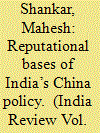

|
|
|
|
|
| Summary/Abstract |
This paper analyzes instances of the Indian leadership’s choice of an escalatory approach in its border dispute with China, first in the adoption of the Forward Policy in the lead up to the 1962 war, and more briefly the more recent decision in 2017 to take escalatory action in response to Chinese activity in the Doklam area in the trijunction of the India-China-Bhutan border region. In doing so, the paper demonstrates how a focus on reputation as an explanatory factor may allow us to make better sense of how Indian leaders have in the past and continue to in the present make decisions on key issues of national security concern.
|
|
|
|
|
|
|
|
|
|
|
|
|
|
|
|
| 10 |
ID:
170900


|
|
|
|
|
| Summary/Abstract |
In a March 2015 speech delivered in Mauritius, India’s current Prime Minister Narendra Modi outlined what he described would be India’s vision for the Indian Ocean Region. Under the acronym, SAGAR or “Security and Growth for All in the Region,” five key points were elucidated. At the time, the speech was praised for articulating a proactive approach to the Indian Ocean and the various visits to, and agreements that followed with, littoral and island countries, appeared to confirm this. This paper seeks to assess the extent to which India has been able to deliver an agenda of security and growth for the maritime region. Despite the enthusiastic reception to SAGAR, the critique is often made that India is slow to deliver on the promises made as part of the country’s maritime and naval diplomacy. The paper highlights a selection of decisions and actions taken since 2015, which have contributed to maritime governance in the region and argues that there is a substantial change in the way SAGAR provides a framework for strategic action.
|
|
|
|
|
|
|
|
|
|
|
|
|
|
|
|
|
|
|
|
|